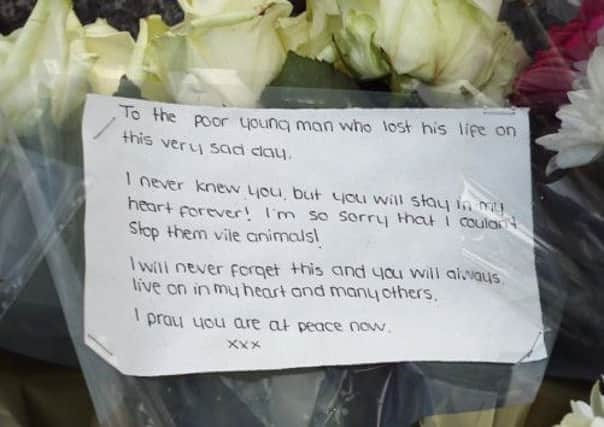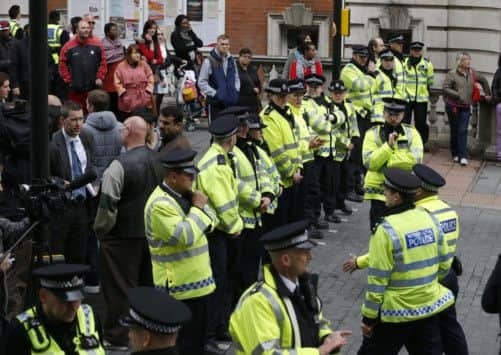Woolwich special report: A community in disbelief


IN SOME ways, life continued as normal in Woolwich yesterday, just 24 hours after the appalling murder of 25-year-old soldier Lee Rigby in the heart of the community.
The market opened and, just 200 yards from the scene of the killing, a wedding took place in the town hall.
Advertisement
Hide AdAdvertisement
Hide AdBut nothing could hide the sense of disbelief and horror which hung over the corner of the London Borough of Royal Greenwich as its residents came to terms what had happened the previous day.


Even for a place with history when it comes to sudden and spectacular acts of violence, this was a shock.
In 1974, the area was rocked when an IRA bomb blew up in the Kings Arms, killing two men. And the community was ripped apart by the riots which hit the UK capital and many other English cities in August 2011.
But the brutal murder of Drummer Rigby, stationed at the local barracks, in broad daylight in front of horrified witnesses had stunned the community.
Flags forlornly flapped at half mast in the wind and driving rain around the bustling centre of Woolwich, just minutes from where the killing took place.
Police packed the area yesterday with vanloads of officers patrolling the streets in bullet-proof jackets.
A massive cordon had been placed around the scene of the crime so that the world’s press, gathered on its edge, could only see the white tent in the distance marking the spot where fusilier had been butchered.
The barracks where Drummer Rigby had been stationed were in lockdown, with soldiers staying inside even as the Prime Minister David Cameron appealed to members of the forces to wear their uniforms on the streets.
Advertisement
Hide AdAdvertisement
Hide AdBeside the police tent marking the spot where he died, a mountain of flowers and wreaths had been placed by people paying their respects to the dead soldier. They were escorted there one by one by police officers as many of them went to say a prayer for him.
Hilary Graham, 48, who has lived in Woolwich for 35 years, was one of those who took a bunch of flowers and red poppy cross to the scene.
“I wanted to go because my son is a cadet and the poor lad knew one of my friends,” she said.
“It’s hard to put what happened into words. We’ve experience the Kings Arms IRA bomb and the there was the bomb found on Woolwich Common, but this is a very different kind of enemy we are facing.”
Like many parts of London, Woolwich has become racially very mixed with racial enclaves springing up for some communities which has led to tensions. Woolwich has a large Somali community, not involved in the attack, but already an object of suspicion.
Mrs Graham described the area as “a melting pot with troubles below the surface”.
She added: “The trouble is if you say that, you are called a racist. I’m not. I say live and let live but there are problems here.
“What gets me is that they [the attackers] were born in this country. Where does such hate come from?” She went on: “I have seen the two men. They used to preach outside Superdrug a lot. They had a table with Islamic literature on it and were always very aggressive.”
Advertisement
Hide AdAdvertisement
Hide AdKerry Costello, 18, who works for the youth charity XLP, came from another part of Greenwich to lay flowers. “It’s a complete tragedy,” she said. “I heard about it on Twitter yesterday and I wanted to come down, pay my respects and say a prayer.”
A few hundred yards away from the murder scene, many of the locals were discussing the events at the Great Harry pub, still shocked by what had taken place.
For one regular, Steve Hart, London mayor Boris Johnson’s attempts to defuse anti-Islamic feelings had not gone down well.
“How can he say this had nothing to do with Islam when you’ve got those guys shouting about it after they killed the guy?” he said. “Of course it is to do with Islam.”
He added: “I remember the IRA bomb but this is worse. This is a never-ending war.”
His friend Roy Vincent said: “This is totally different to the IRA. How do these guys get persuaded to go and blow themselves up or just attack in public like that?”
Another man, Grant Edwards, described how the soldiers normally just mix with the community, come down from the barracks and use the services in Woolwich.
“The poor guy was probably just going to the bank or maybe coming for a pint and was just there at the wrong time,” he said.
Advertisement
Hide AdAdvertisement
Hide Ad“It’s disgusting. It’s hard to know how they even knew it was a soldier.”
There was a strong feeling that, Ingrid Loyau-Kennett, who confronted the attackers, should be rewarded for her bravery. She really showed courage there,” said Mr Hart. “While others stood around they went and faced up to them. She could have got killed.”
But even in one of the black communities in Woolwich there was a feeling that the killing could provoke a race issue.
Daniel Musgrove said an internet cafe he uses in the area regularly has pro-al-Qaeda websites left on it from previous users.
He was also afraid how the white community would react. “It’s a terrible thing what happened,” he said.
“But the authorities should be taking a closer look at this area because there are al-Qaeda sympathisers around here.
“But it worries me that this is going to end up provoking racial tensions again. There is history in this part of London. Stephen Lawrence was killed not far from here and others too. I just hope it does not start all over again.”